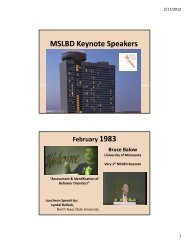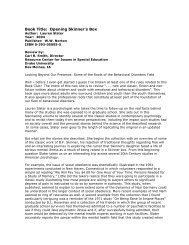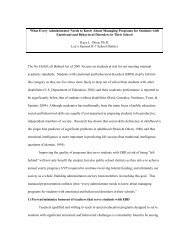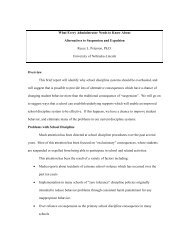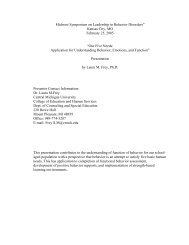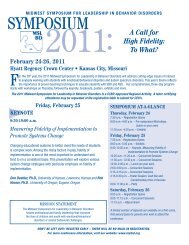2011 Conference Flyer - MSLBD
2011 Conference Flyer - MSLBD
2011 Conference Flyer - MSLBD
Create successful ePaper yourself
Turn your PDF publications into a flip-book with our unique Google optimized e-Paper software.
MIDWEST SYMPOSIUM FOR LEADERSHIP IN BEHAVIOR DISORDERS<br />
SYMPOSIUM<br />
<strong>2011</strong>:<br />
February 24-26, <strong>2011</strong><br />
Hyatt Regency Crown Center • Kansas City, Missouri<br />
A Call for<br />
High Fidelity:<br />
To What?<br />
For the 29 th year, the <strong>2011</strong> Midwest Symposium for Leadership in Behavior Disorders will address cutting-edge issues of interest<br />
to anybody working with students with emotional/behavioral disorders and autism spectrum disorders. This year’s theme reflects<br />
the importance of proven teaching techniques to educate students with EBD and ASD. Our comprehensive, three-day program<br />
starts with workshops on Thursday, followed by keynote, breakouts, posters, exhibits and more.<br />
The <strong>2011</strong> Midwest Symposium for Leadership in Behavior Disorders Is a CCBD-Approved Regional Activity. A letter certifying<br />
attendance may be requested at the registration table to submit for CEU’s.<br />
KEYNOTE<br />
8:30-10:00 a.m.<br />
Friday, February 25<br />
Measuring Fidelity of Implementation to<br />
Promote Systems Change<br />
Changing educational systems to better meet the needs of students<br />
is complex work. Among the many factors in play, fidelity of<br />
implementation is one of the most important to understand and<br />
tend to on a consistent basis. This presentation will explore various<br />
system change strategies with particular emphasis on fidelity of<br />
implementation.<br />
Don Deshler, Ph.D., University of Kansas, Lawrence, Kansas and Rob<br />
Horner, Ph.D., University of Oregon, Eugene, Oregon<br />
Mission Statement<br />
The Midwest Symposium for Leadership in Behavior Disorders<br />
fosters professional and family leadership that improves<br />
the lives of children and youth with emotional/behavioral<br />
disorders or related behavioral challenges.<br />
SYMPOSIUM AT-A-GLANCE<br />
Thursday, February 24<br />
7:30 a.m. – Registration Opens<br />
9:00 a.m.-4:00 p.m. – Pre-symposium Workshops<br />
(lunch on your own)<br />
11:30 a.m.-4:30 p.m. – Exhibits<br />
Friday, February 25<br />
7:30 a.m. - Registration Opens<br />
8:00 a.m.-5:00 p.m. – Exhibits<br />
8:30-10:00 a.m. – Keynote, Measuring Fidelity of<br />
Implementation to Promote Systems Change<br />
10:20 a.m.-11:20 a.m. – Concurrent Sessions<br />
11:30 a.m.-12:30 p.m. – Concurrent Sessions<br />
12:30-2:00 p.m. – Lunch (on your own)<br />
2:00-3:00 p.m. – Concurrent Sessions<br />
3:15-4:15 p.m. – Concurrent Sessions<br />
4:15-6:30 p.m. – Poster Session: Cash Bar and<br />
Complimentary Hors d’Oeuvres<br />
8:00-11:00 p.m. – Party<br />
Saturday, February 26<br />
8:00 a.m. – Registration Opens<br />
9:00-11:15 a.m. – Concurrent Sessions<br />
11:15 a.m. – Adjournment<br />
A limited number of stipends are available on a first-come,<br />
first-served basis for parents who wish to attend the<br />
conference.<br />
DON’T BE LEFT OUT!! REGISTER EARLY – THERE WILL BE NO WALK-IN REGISTRATION.<br />
For more conference information, visit our website: www.mslbd.org
Presymposium<br />
WORKSHOPS<br />
Thursday, February 24 – 9:00 a.m.-4:00 p.m.<br />
HALF-DAY<br />
Morning (9:00 a.m.- noon)<br />
1. Resistance to Change: Overcoming<br />
Limitations through the Application<br />
of the 80/20 Principle<br />
Public schools often have organizational structures that form<br />
barriers for dealing effectively with students’ challenging<br />
behaviors. Improving student behavior requires shifting away<br />
from established paradigms and the impediments they cause.<br />
Paradigms exist as unquestioned tacit understanding and<br />
changing them exposes individuals and institutions to risks they<br />
may not be willing to take. This presentation exposes the logical<br />
flaws in the dominant paradigm and common misconceptions for<br />
managing students’ challenging behaviors. Resistance to change<br />
occurs at both institutional and individual levels. Also presented<br />
is a method for establishing new paradigms by making use of the<br />
80/20 principle which states that 80% of efforts result in only 20%<br />
of outcomes. The goal is for schools to develop flexibility and<br />
maximize resources for addressing students’ challenging<br />
behaviors.<br />
John Maag, University of Nebraska-Lincoln, Lincoln, Nebraska<br />
2. Behavior 101: The Basics<br />
This session is designed by experienced practitioners and will<br />
present evidence-based behavioral management practices<br />
grounded in the philosophy of positive behavior support<br />
that provide the foundation for successful programming<br />
for students with behavioral challenges. Emphasis will be<br />
placed on using functional behavioral assessment and ongoing<br />
data for decision making. Topics presented will include<br />
prevention strategies, direct instruction of replacement behavior,<br />
various reinforcement strategies, self-management, peer-based<br />
interventions, and natural/logical undesirable consequences.<br />
Kaye Otten, Lee’s Summit School District, Lee’s Summit, Missouri;<br />
Jody Tuttle, Loess Hills Area Education Agency #13, Council<br />
Bluffs, Iowa; and Matt McNiff, Educational Service Unit # 5,<br />
Beatrice, Nebraska<br />
3. Bullying Prevention and Intervention:<br />
Realistic Strategies for Schools<br />
This workshop will provide practical suggestions and<br />
recommendations for how research on bullying behaviors can<br />
be translated into the selection, implementation, and evaluation<br />
of bullying prevention and intervention strategies. Participants<br />
will be encouraged to consider bullying from a social-ecological<br />
perspective by understanding individual characteristics (impulsivity,<br />
depression, anxiety): familial influences (lack of supervision, sibling<br />
conflict, coercive family processes); environmental factors (peer<br />
group, community norms); and specific attitudes and behaviors<br />
that underlie the engagement in bullying behavior. A data-based<br />
decision-making model to assess the scope of bullying behaviors<br />
will be introduced and reviewed. Participants will watch a<br />
unique video resource, “Stories of Us” (www.storiesofus.com)<br />
and will leave the workshop with practical strategies on how<br />
to reduce bullying in their schools.<br />
Susan M. Swearer, Ph.D., University of Nebraska-Lincoln, Lincoln,<br />
Nebraska<br />
4. Creating Culturally Responsive<br />
Instruction: For Student’s and<br />
Teacher’s Sake<br />
Improving the quality of school life and educational outcomes of<br />
culturally different students continues to be a challenge in our<br />
schools. As the P-12 student population becomes increasingly<br />
diverse, we must examine how teachers engage culturally different<br />
learners and their families in the teaching and learning process<br />
and the prevention of behavior problems. In culturally responsive<br />
schools, evidence-based strategies and positive behavior support<br />
techniques implemented should respond to students’ cultural<br />
backgrounds. Culturally different learners will achieve both<br />
academically and socially if their teachers use a strengths-based<br />
approach and infuse cultural relevancy in their lesson plan design<br />
and delivery and throughout the classroom. Teachers will learn<br />
how to bring the elements of their student’s culture into the<br />
classroom and link classroom content to students’ lives and<br />
community experiences so that culturally different students<br />
can learn and utilize socially appropriate skills.<br />
Cathy Kea, Ph.D., North Carolina A&T State University, Greensboro,<br />
North Carolina
Advance registration for all presymposium workshops is required<br />
Note: Workshops may fill up. Please mark a #1 selection and an alternate<br />
#2 selection for the morning session AND a #1 selection and an alternate<br />
#2 selection for the afternoon session.<br />
WORKSHOPS<br />
Afternoon (1:00-4:00 p.m.)<br />
5. Effective Instructional Practices for<br />
Preventing and Ameliorating Chronic<br />
Problem Behavior in Classroom-based<br />
Settings<br />
This session will present behavioral strategies that teachers can<br />
employ to prevent and ameliorate chronic problem behaviors<br />
demonstrated by students in their classrooms. Antecedent<br />
strategies, including effective instructional and classroom<br />
management practices, will be emphasized. The format of the<br />
session will include didactic presentation and case illustrations.<br />
Participants will gain strategies to apply immediately to the<br />
classroom situation.<br />
Kevin Sutherland, Ph.D., Virginia Commonwealth University,<br />
Richmond, Virginia; and Maureen Conroy, Ph.D., University of<br />
Florida, Gainesville, Florida<br />
6. Mermaid Troubles: Navigating<br />
the Sea of Autism and Adolescent<br />
Sexuality<br />
Individuals with ASD experience the same challenges of<br />
adolescence as other teenagers—but in the extreme! This<br />
presentation will focus on practical ideas for teaching sexuality,<br />
hygiene, and the complicated issues of teenage relationships.<br />
Ideas for teaching the “who, what, when, where and how”<br />
of relationships and sexuality will be presented. Ms. Beytien<br />
will share her real-life experiences working with, and raising,<br />
teenagers with ASD. Participants will gain practical ideas and<br />
solutions to perplexing issues.<br />
Alyson Beytien, parent, Mercy Hospital Autism Center, Dubuque,<br />
Iowa<br />
7. Behavior Management: More Strategies<br />
that STICK<br />
This interactive workshop will focus on providing participants with<br />
strategies and tools to support students with challenging behavior<br />
in inclusive classrooms. Strategies addressing class-wide, targeted,<br />
and individual student needs will be included in this hands-on,<br />
interactive session. Participants will have multiple opportunities<br />
to role-play, practice, and identify situations in their own school<br />
settings where the tools presented can be effectively put into<br />
practice.<br />
Howard P. Wills, Ph.D. and Maura Wechsler Linas, Ph.D., Juniper<br />
Gardens Children’s Project, Kansas City, Kansas<br />
8. Developing Comprehensive, Integrated,<br />
Three-Tiered Models of Prevention: The<br />
Importance of Systematic Screening<br />
Tools<br />
The intent of this workshop is to provide practitioners and<br />
researchers with an introduction into comprehensive, integrated<br />
three-tiered models of prevention featuring academic (responseto-intervention),<br />
behavioral (positive behavior supports), and social<br />
(e.g., Positive Action) components. We will establish the importance<br />
of primary, secondary, and tertiary supports to prevent the<br />
development of and respond to existence of cases of emotional and<br />
behavioral disorders. Participants will be able to apply practical<br />
illustrations of how to use systematic screening tools within<br />
this model to (a) measure the overall level of risk present in<br />
a school over time and (b) identify students who may require<br />
targeted supports.<br />
Kathleen Lynne Lane, Ph. D., Vanderbilt University, Nashville,<br />
Tennessee<br />
SOMETHING NEW! <strong>MSLBD</strong>’s Got Talent Show and Party Friday night in Atlanta/Regency Foyer!<br />
Share your serious or just plain fun talents, individual or group, with your <strong>MSLBD</strong> friends.<br />
There will be prizes! All symposium registrants will receive a voucher toward free beer<br />
or other beverage of choice. Visit <strong>MSLBD</strong>.org for more information.<br />
For program updates, go to www.mslbd.org
Hotel<br />
RESERVATIONS<br />
Hyatt Regency Crown Center<br />
2345 McGee St<br />
Kansas City, MO 64108<br />
$126.00 double/single per night + tax<br />
$151.00 triple + tax<br />
Contact the Hyatt Regency Hotel directly for reservations (toll<br />
free 888-421-1442; local 402-592-6464) or https://resweb.<br />
passkey.com/go/<strong>MSLBD</strong>. Be sure to request the special<br />
Symposium rate! Accommodations for individuals with<br />
disabilities are available.<br />
Cutoff dates for room reservations: January 24, <strong>2011</strong><br />
Symposium<br />
REGISTRATION<br />
Name_____________________________________________<br />
Address___________________________________________<br />
City_______________________________________________<br />
State_________________ Zip__________________________<br />
Daytime Telephone (_________)_________________________<br />
The Hyatt is centrally located within easy access of Crown<br />
Center, Downtown, restaurants in the new Power and Light<br />
District, new Sprint Center, Country Club Plaza, and Old<br />
Westport. All-weather swimming, ice skating, gym, steam<br />
room, sauna and Jacuzzi are available.<br />
Special Accommodations<br />
Sign language interpreters provided with advance arrangement.<br />
Contact Ron & Elaine Schmidt at Midwest Symposium for<br />
Leadership in Behavior Disorders, 1120 Douglas Drive, Lawrence,<br />
Kansas 66049, 785-842-8219 or rschmidt@sunflower.com.<br />
Register Today and $ave!!<br />
CHOICE OF PRESYMPOSIUM WORKSHOP<br />
ON THURSDAY<br />
Note: Workshops may fill up. Please mark a #1 selection and<br />
alternate #2 selection for the morning session, AND a #1 selection and<br />
an alternate #2 selection for the afternoon session.<br />
HALF-DAY WORKSHOPS ON THURSDAY<br />
Morning<br />
_____ 1. Resistance to Change: Application of the 80/20 Principle<br />
_____ 2. Behavior 101: The Basics<br />
_____ 3. Bullying Prevention and Intervention: Realistic Strategies<br />
for Schools<br />
_____ 4. Creating Culturally Responsive Instruction<br />
E-mail_____________________________________________<br />
Position____________________________________________<br />
Cancellations received before January 20<br />
are subject to a $35 administrative fee.<br />
No refunds will be issued after January 21.<br />
REGISTRATION OPTIONS<br />
Please indicate which you will attend:<br />
Postmarked<br />
after Jan. 21<br />
____ Presymposium Workshop $140 $160<br />
and Symposium<br />
(Thursday, Friday, & Saturday)<br />
_____ Symposium $125 $145<br />
(Friday & Saturday only)<br />
_____ Pre-symposium Workshop ONLY $110 $130<br />
(Thursday only)<br />
Afternoon<br />
_____ 5. Instruct. Practices for Preventing & Ameliorating Problem<br />
Behavior<br />
_____ 6. Navigating Autism and Adolescent Sexuality<br />
_____ 7. Behavior Management: Strategies that STICK<br />
_____ 8. Three-Tiered Models of Prevention: Systematic Screening<br />
Tools<br />
SATURDAY MORNING WORKSHOPS<br />
Mark your choice to attend.<br />
_____ Supports and Interventions for Classroom Management<br />
_____ Implementing, Evaluating and Monitoring Behavior<br />
Intervention Plans<br />
_____ Keeping up with Legal Requirements Regarding Children<br />
with Disabilities<br />
PAYMENT<br />
In order to process your registration, we require one of the following:<br />
_____ Check payable to Midwest Symposium<br />
_____ Agency purchase order enclosed<br />
RETURN YOUR REGISTRATION TO:<br />
Midwest Symposium for Leadership in Behavior Disorders<br />
1120 Douglas Drive, Lawrence, Kansas 66049 • Fax 785-856-0475<br />
All registrations are processed on a first-come,<br />
first-served basis. Space is limited!<br />
REGISTER EARLY!! No walk-in registration.
CONCURRENT SESSIONS – FRIDAY<br />
Master Teacher Strand continues through 4 breakout<br />
sessions<br />
*Preventing Dangerous Behavior: Intervention During<br />
the Cycle<br />
HOUR #1 CALM, An Ounce of Prevention is Worth a<br />
Pound of Cure<br />
*Mary Schlieder<br />
HOUR #2 and #3 AGITATION, ACCELERATION, Diffusing<br />
the Bomb: Management Not Manhandling<br />
*Michalla Schartz and *Sandy Smith<br />
HOUR #4 RECOVERY, Picking Up the Pieces:<br />
Processing with Individuals and School Personnel<br />
and Enhancing Program Structure for Student<br />
Success<br />
*Staci Mathes and *Matt McNiff<br />
*Master teacher presentations<br />
An Early Intervention Model for Students with Autism<br />
Spectrum Disorder<br />
Josefa Ben-Arieh, USD #345, Manhattan, Kansas<br />
The Behavior Lab Concept<br />
Janet Burgess and Mary Laird, North Kansas City<br />
School District, Liberty, Missouri<br />
Discrete Trial Training: Miracle Cure or Time-<br />
Consumptive Curse for Children with Autism<br />
Spectrum Disorder<br />
Judith Carlson, Rockhurst University, Kansas City,<br />
Missouri<br />
Take Some Time! A Great Plan for Shaping My<br />
Behavior<br />
Austyn Carson and Toni Marie Alstrom, Marysville<br />
Public Schools, Marysville, Kansas<br />
Self-regulation in Young Children: Determining<br />
Intervention Strategies Based on Intrinsic and<br />
Extrinsic Factors<br />
Rebecca J. Cook, Frank Mullins and Melissa Jones,<br />
Eastern Illinois University, Charleston, Illinois<br />
Effective Strategies for Teaching Reading to Students<br />
with Challenging Behaviors<br />
Justin Cooper and Beth Ann Pruitt, Eastern Kentucky<br />
University, Richmond, Kentucky; Amy Lingo and Todd<br />
Whitney, University of Louisville, Louisville, Kentucky<br />
A Move to Self-Management: A Movie Montage<br />
Christina Edmonds-Behrend, Jennifer L. Stringfellow,<br />
and Frank Mullins, Eastern Illinois University,<br />
Charleston, Illinois<br />
Observing the Behavior of Students with Emotional<br />
Disturbance: The Observation Form<br />
Michael H. Epstein, University of Nebraska-Lincoln,<br />
Nebraska; and Doug Cullinan, North Carolina State<br />
University, Raleigh, North Carolina<br />
Functional Behavior Assessment: Is it an Evidence-<br />
Based Practice?<br />
Nicholas A. Gage and Tim Lewis, University of<br />
Missouri, Columbia, Missouri<br />
Integrating School-Wide PBIS in Separate Sites<br />
for Students with EBD: Lessons Learned Towards<br />
Implementation<br />
Shelley Neilsen Gatti, University of St. Thomas,<br />
Minneapolis, Minnesota; and Kim Adams, Minneapolis<br />
Schools, Minneapolis, Minnesota<br />
The Interrelationship Between Language, Academic<br />
Skills, and Behavior for Students with Emotional or<br />
Behavioral Disorders<br />
Lisa Goran and Nicholas Gage, University of Missouri,<br />
Columbia, Missouri<br />
The Keys to Success: Academic Engagement and<br />
Positive Reinforcement in the Classroom<br />
Carly Graber and Kelly Price, Lehigh University,<br />
Bethlehem, Pennsylvania<br />
Mathematics for Students Exhibiting Challenging<br />
Behavior: Characteristics of Learners and Strategies<br />
for Intervention<br />
Regina Hirn and Amy Lingo, University of Louisville,<br />
Louisville, Kentucky<br />
Fidelity to a Comprehensive Evaluation of Reading<br />
Difficulties/Dyslexia and Attention Eliminate the<br />
Potential for Misidentification<br />
David P. Hurford and Kara A. Lasater, Pittsburg State<br />
University, Pittsburg, Kansas<br />
Methods for Assessing Treatment Implementation:<br />
Using Practical Fidelity Measurements that Support<br />
Supervision and Training<br />
Kristin Duppong Hurley, Nikki M. Wheaton and<br />
Justin Sullivan, University of Nebraska-Lincoln,<br />
Lincoln, Nebraska<br />
Using Literature to Support Learning (and More<br />
Importantly—Behavior)!<br />
Melissa Jones, Christina Edmonds-Behrend,<br />
and Jennifer Stringfellow, Eastern Illinois University,<br />
Charleston, Illinois<br />
The Janus Project: The Damsels of Deviance Reveal<br />
All<br />
Marilyn Kaff and Jim Teagarden, Kansas State<br />
University, Manhattan, Kansas<br />
Teaching Emotion Recognition to Adolescents with<br />
Social Competency Deficits<br />
Kristin Lierheimer, University of Missouri, Columbia,<br />
Missouri<br />
Implementing PBIS with Existing School-Wide and<br />
Classroom-Wide Behavior Change Programs<br />
Sara McDaniel and Nicole Swosowski, Georgia State<br />
University, Atlanta, Georgia<br />
Sustaining High Fidelity of Teacher-Implemented<br />
Evidence-Based Practices<br />
Regina M. Oliver and Joseph Wehby, Vanderbilt<br />
University, Nashville, Tennessee<br />
Central Nebraska Support Service Program Behavior<br />
Consultation Model<br />
Melody Pebley, Molly Elge and Barb Gentrup, Grand<br />
Island Public Schools, Grand Island, Nebraska<br />
A Consumer’s Guide to Crisis Intervention Training<br />
Programs for Schools<br />
Reece L. Peterson, University of Nebraska-Lincoln,<br />
Lincoln, Nebraska; and Michael A. Couvillon, Drake<br />
University, DesMoines, Iowa<br />
Evidence of a Gap in Specific Reading Skills:<br />
Instructional Implications for Students with Behavior<br />
Disorders<br />
Corey Pierce, University of Northern Colorado, Greeley,<br />
Colorado<br />
Ready…Set…Read!: Research-Based Reading<br />
Strategies<br />
Kelly Price and Carly Graber, Lehigh University,<br />
Bethlehem, Pennsylvania<br />
Video Modeling for Students with Autism Spectrum<br />
Disorders<br />
Amy Quinley and Mendy Ruthrauff, Shawnee Mission<br />
School District, Shawnee Mission, Kansas<br />
Reintegrating Youth with Behavior Disorders into the<br />
Community School Classroom: Parent, Youth and<br />
Educator Opinions<br />
Alexandra Trout and Jacqueline Huscroft-D’Angelo,<br />
University of Nebraska-Lincoln, Lincoln, Nebraska<br />
Social Competence Intervention for Elementary<br />
Students with Asperger Syndrome and High<br />
Functioning Autism<br />
Karen Visovsky, Janine Stichter and Stephanie<br />
McGee, University of Missouri, Columbia, Missouri<br />
Chronic and Intense Behavior: An Intensive Teaching<br />
Process for Students Out of Instructional Control<br />
Tricia Wells, Longmont, Colorado<br />
Functional Behavior Assessment: Not for the Faint<br />
of Heart<br />
Stephanie Woodley, Christina Edmonds-Behrend,<br />
and Jennifer Stringfellow, Eastern Illinois University,<br />
Charleston, Illinois<br />
SPECIAL<br />
2-HOUR SESSIONS<br />
SATURDAY<br />
9:00-11:15 a.m.<br />
Supports and Interventions for Classroom<br />
Management for Students on the Autism<br />
Spectrum<br />
Shari Hardinger, MSED, Shawnee Mission,<br />
Kansas School District and Cindy VanHorn,<br />
MSED, Blue Valley Kansas School District<br />
Implementing, Evaluating and Monitoring<br />
Behavior Intervention Plans<br />
Michael A. Couvillon, Ph.D., Drake University,<br />
DesMoines, Iowa<br />
Keeping Up With Legal Requirements<br />
Regarding Children with Disabilities<br />
Richard Whelan, Ph.D., and Mark Ward, Attorney,<br />
Kansas State Department of Education<br />
For program updates, go to www.mslbd.org
How to<br />
GET THERE<br />
Driving in:<br />
The Hyatt is located at 2345 McGee in Kansas City,<br />
Missouri. The following are directions to the hotel from:<br />
I-70 Eastbound: Take I-35 South exit to 20th Street exit.<br />
Turn left on 20th Street. Right on McGee Street to hotel<br />
entrance.<br />
I-70 Westbound: Take I-35 South exit to 20th Street exit.<br />
Turn left on 20th Street. Right on McGee Street to hotel<br />
entrance.<br />
I-35 Southbound: Take I-35 South to 20th Street exit.<br />
Turn left on 20th Street. Right on McGee Street to hotel<br />
entrance.<br />
I-35 Northbound: Take I-35 North to Broadway exit.<br />
Turn right on Broadway. Turn left on 20th Street. Right on<br />
McGee Street to hotel entrance.<br />
PARKING:<br />
Parking may be found in the parking facility immediately to the north of the Hyatt. Cost<br />
per day for guests staying at the hotel is $14.50 for self-parking. For hourly parking, the<br />
rate is incremental beginning at $8.00 per hour after the first FREE 3 hours. Be sure to<br />
get your ticket validated at Guest Services in the lobby. Additional parking is available in<br />
the Crown Center complex.<br />
FLYING in:<br />
To get to the Hyatt from MCI, go to the Super Shuttle Booth in the terminal and state that<br />
you “want transportation to Hyatt Regency, Crown Center.” Cost is $18.00 one way;<br />
$30.00 roundtrip. Cab fare is approximately $50.00 one way.<br />
ADDITIONAL INFORMATION:<br />
Ron and Elaine Schmidt, managers<br />
1120 Douglas Drive, Lawrence, Kansas 66049<br />
785-842-8219; fax 785-856-0475<br />
rschmidt@sunflower.com<br />
See You February 24-26, <strong>2011</strong><br />
A Call to High Fidelity: To What?<br />
FOR THE LATEST ON<br />
BEST PRACTICES IN E/BD<br />
Midwest Symposium for<br />
Leadership in Behavior Disorders<br />
1120 Douglas Drive<br />
Lawrence, Kansas 66049<br />
ATTENTION:<br />
Special Education Teacher<br />
Nonprofit Organization<br />
U.S. Postage<br />
PAID<br />
Shawnee Mission, KS<br />
Permit #519



